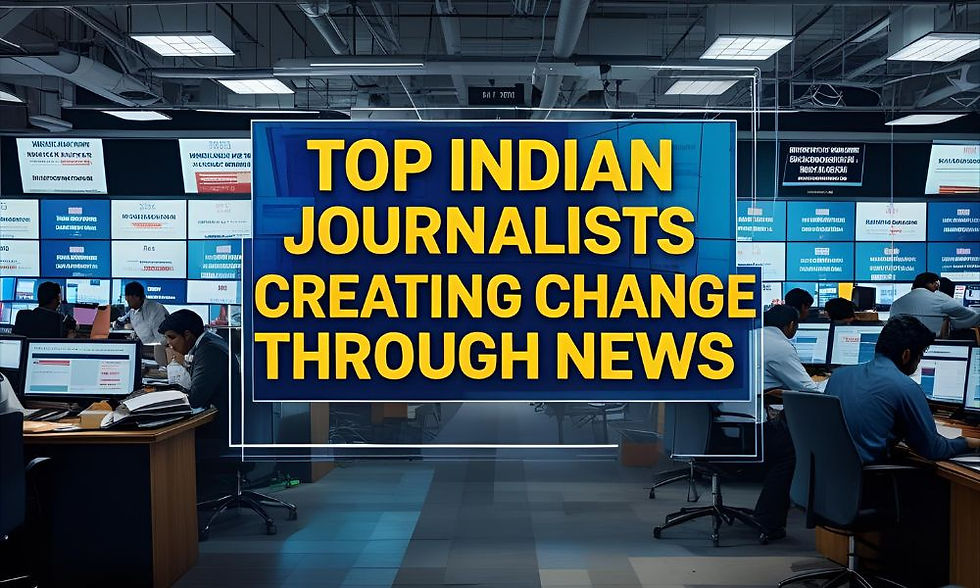Top Indian Journalists Creating Change Through News
- Aditya Traffictail
- Aug 27
- 4 min read
In the evolving media landscape of India, the role of journalists is more crucial than ever. The Top Indian Journalists are not only reporting the news—they are creating change, influencing public opinion, and shaping the way society understands critical issues. From political reporting to social justice coverage, these journalists stand at the forefront of truth, ethics, and accountability. Their work inspires millions of readers and viewers while setting new standards for the journalism industry.

How Top Indian Journalists Drive Change in India
The impact of journalism goes beyond headlines. The Top Indian Journalists leverage their platforms to highlight corruption, advocate for social justice, and expose issues that would otherwise remain unnoticed. In 2025, Indian journalism has witnessed a transformative shift with digital media amplifying the reach and voice of credible journalists. Their investigative reporting, ethical standards, and courageous storytelling ensure that citizens stay informed and empowered.
Inspiring Stories of Top Indian Journalists
The career journeys of India’s leading journalists demonstrate the power of perseverance, integrity, and innovation. Let’s explore the stories of some of the Top Indian Journalists who are creating real change through their work:
1. Ravish Kumar – Champion of the Voiceless
Ravish Kumar has consistently focused on issues affecting ordinary citizens. Known for his grassroots reporting and empathetic storytelling, his work has brought attention to marginalized communities and highlighted social inequalities. His fearless approach continues to set benchmarks for Hindi journalism.
2. Barkha Dutt – Breaking Barriers in Broadcast Media
Barkha Dutt rose to prominence during the Kargil War and has since been a pioneering figure in broadcast journalism. Her work combines field reporting with insightful analysis, creating awareness about pressing national and international issues while mentoring upcoming journalists.
3. Rajdeep Sardesai – Political Reporting Expert
Rajdeep Sardesai is celebrated for his in-depth political analysis and unbiased reporting. His career exemplifies how journalists can maintain credibility while navigating complex political landscapes, helping citizens make informed decisions.
4. Arnab Goswami – Prime-Time Debate Innovator
Arnab Goswami revolutionized debate-based journalism with his high-energy presentation style. His platform engages millions of viewers and encourages discussions on political, social, and economic issues, demonstrating the power of media to influence public dialogue.
5. Faye D’Souza – Advocate for Civic Issues
Faye D’Souza’s journalism focuses on urban and civic concerns, shining a light on everyday challenges faced by citizens. Her dedication to presenting facts without sensationalism has earned her widespread respect and credibility.
6. Nidhi Razdan – Balanced and Thoughtful Reporting
Nidhi Razdan has built her reputation as a journalist who values balance, accuracy, and clarity. Her calm and professional style inspires aspiring journalists to prioritize integrity and diligence in their reporting.
7. P. Sainath – Rural India Storyteller
P. Sainath’s work emphasizes the struggles of rural communities, farmers, and underrepresented groups. His reporting has catalyzed conversations on rural development and policy change, highlighting the importance of inclusive journalism.
8. Shereen Bhan – Business and Economy Authority
Shereen Bhan’s journalism bridges the gap between complex financial topics and the general audience. Her reporting has empowered citizens to understand economic developments and financial decisions more clearly.
9. Anjana Om Kashyap – Connecting with the Masses
Anjana Om Kashyap’s career showcases the ability to connect with large audiences while reporting on critical issues. Her work emphasizes clear communication, engagement, and the impact of news on society.
10. Sreenivasan Jain – Ethical Reporting Advocate
Sreenivasan Jain is known for investigative reporting that challenges corruption and injustice. His unwavering commitment to ethics and factual reporting demonstrates the true role of journalism in a democracy.
Key Trends Highlighted by Top Indian Journalists
Digital Expansion – Journalists are leveraging social media, podcasts, and online news platforms to reach broader audiences.
Investigative Journalism – Deep-dive reporting on corruption, governance, and human rights continues to grow in importance.
Multilingual Reporting – Expanding news in multiple Indian languages ensures inclusivity and accessibility.
Ethical Journalism – Transparency, accuracy, and fairness are increasingly prioritized over sensationalism.
Audience Engagement – Modern journalists engage directly with viewers and readers, fostering interaction and trust.
Why Their Stories Matter
The Top Indian Journalists are role models for aspiring media professionals. Their career trajectories show that journalism is about courage, curiosity, and commitment to truth. By understanding their stories, audiences gain insight into the challenges, achievements, and societal impact of credible news reporting.
Conclusion
The Top Indian Journalists are redefining journalism in 2025 by creating change through responsible reporting, ethical standards, and innovative storytelling. Their inspiring career journeys highlight the importance of resilience, dedication, and integrity in shaping society.
For media organizations and startups looking to create impactful news platforms, leveraging professional support is key. Companies like 7kNetwork help in building digital solutions that amplify credible journalism, enabling journalists to reach wider audiences and continue their mission of creating meaningful societal impact.
FAQs
Q: Who are considered the Top Indian Journalists today?
Answer: Some of the top Indian journalists include Ravish Kumar, Barkha Dutt, Rajdeep Sardesai, Arnab Goswami, Faye D’Souza, Nidhi Razdan, P. Sainath, Shereen Bhan, Anjana Om Kashyap, and Sreenivasan Jain.
Q: How do journalists create change through their work?
Answer: They highlight issues, hold authorities accountable, educate the public, and bring attention to social, economic, and political matters that might otherwise remain unnoticed.
Q: What qualities make a journalist influential in India?
Answer: Courage, integrity, ethical reporting, adaptability to digital tools, and a commitment to truth are key qualities.
Q: How has digital media changed journalism in India?
Answer: Digital media has enabled real-time reporting, direct engagement with audiences, data-driven storytelling, and wider reach for independent and regional journalism.
Q: Why are career stories of journalists inspiring?
Answer: They demonstrate perseverance, dedication to truth, and the ability to impact society positively despite challenges like political pressure or misinformation.












Comments